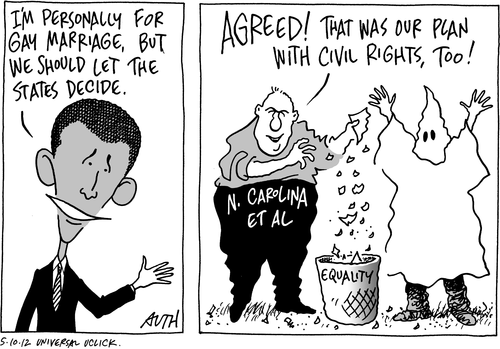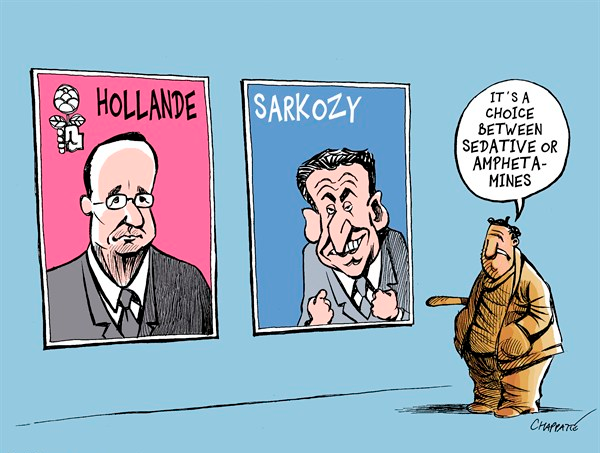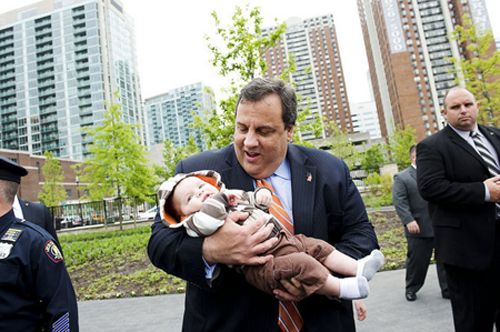Cross posted from The Stars Hollow Gazette
 In New York City, U.S. District Judge Katherine Forrest ruled that the indefinite detention provision of the National Defense Authorization Act (NDAA) is unconstitutional in violation of the First and Fifth Amendments. The NDAA was signed into law by President Obama in late December after a veto threat over language that was eventually changed at his request.
In New York City, U.S. District Judge Katherine Forrest ruled that the indefinite detention provision of the National Defense Authorization Act (NDAA) is unconstitutional in violation of the First and Fifth Amendments. The NDAA was signed into law by President Obama in late December after a veto threat over language that was eventually changed at his request.
In a 68-page ruling blocking this statute, U.S. District Judge Katherine Forrest agreed that the statute failed to “pass constitutional muster” because its broad language could be used to quash political dissent.
“There is a strong public interest in protecting rights guaranteed by the First Amendment,” Forrest wrote. “There is also a strong public interest in ensuring that due process rights guaranteed by the Fifth Amendment are protected by ensuring that ordinary citizens are able to understand the scope of conduct that could subject them to indefinite military detention.”
This puts a whole new spin on today’s debate in the House floor Thursday of an amendment to the NDAA proposed by Representatives Adam Smith (D-Wash.) and Justin Amash (R-Mich.), that would undo the detention provisions and bar military detention for any terror suspects captured on U.S. soil. The ruling was made in response to a law suit brought by former New York Times war correspondent and Pulitzer Prize winner, Chris Hedges and others who argued that the law would have a “chilling effect” on their work:
Hedges was joined in the suit by linguist, author and dissident Noam Chomsky, Pentagon whistle-blower Daniel Ellsberg and other high-profile activists, scholars and politicians.
Hedges argued in his testimony that his work as a journalist would bring him into contact with terrorist organizations that would, given the scope of the law, qualify him for indefinite detention. The plaintiffs argued that the threat of detention alone would be an unconstitutional encroachment on their First Amendment rights to free expression and association, as well as a violation of the Fifth Amendment right to due process.
As Glen Greenwald points out in his Salon article, the court rejected the argument by the government that the NDAA did nothing more than the 2001 AUMF already did and thus did not really expand the Government’s power of indefinite detention:
The court cited three reasons why the NDAA clearly expands the Government’s detention power over the 2001 AUMF (all of which I previously cited when denouncing this bill).
First, “by its terms, the AUMF is tied directly and only to those involved in the events of 9/11,” whereas the NDAA “has a non-specific definition of ‘covered person’ that reaches beyond those involved in the 9/11 attacks by its very terms.”
Second, “the individuals or groups at issue in the AUMF are also more specific than those at issue in § 1021″ of the NDAA; that’s because the AUMF covered those “directly involved in the 9/11 attacks while those in § 1021 [of the NDAA] are specific groups and ‘associated forces’.” Moreover, “the Government has not provided a concrete, cognizable set of organizations or individuals that constitute ‘associated forces,’ lending further indefiniteness to § 1021.”
Third, the AUMF is much more specific about how one is guilty of “supporting” the covered Terrorist groups, while the NDAA is incredibly broad and un-specific in that regard, thus leading the court to believe that even legitimate activities could subject a person to indefinite detention.
The court also decisively rejected the argument that President Obama’s signing statement – expressing limits on how he intends to exercise the NDAA’s detention powers – solves any of these problems. That’s because, said the court, the signing statement “does not state that § 1021 of the NDAA will not be applied to otherwise-protected First Amendment speech nor does it give concrete definitions to the vague terms used in the statute.”
(emphasis mine)
A word of caution, we shouldn’t celebrate victory just yet. This is a preliminary injunction issued by one judge and the government will surely appeal it the Circuit Court.
The debate in the House on the amendment to the NDAA introduced by House Armed Services ranking member Adam Smith (D-Wash.) and Rep. Justin Amash (R-Mich.) that would undo the detention provisions and bar military detention for any terror suspects captured on U.S. soil, will go on this afternoon. The amendment has strong bipartisan support in the House. We still need to take action and write our Representatives to vote for this amendment.

 Vice President Joe Biden started a storm over marriage equality when he announced on Meet the Press that same sex marriage was OK with him. The press immediately wanted to know if President Obama’s position had “evolved.” The Biden interview was taped on Friday, so the White House was fully aware of what he had said. Finally, after
Vice President Joe Biden started a storm over marriage equality when he announced on Meet the Press that same sex marriage was OK with him. The press immediately wanted to know if President Obama’s position had “evolved.” The Biden interview was taped on Friday, so the White House was fully aware of what he had said. Finally, after  While all eyes were on France, the ouster of Nicholas Sarkozy and a rejection of austerity, Iran has been conducting its first elections since the 2009 elections that reinstalled Mahmoud Ahmadinejad as president. This was the second round of voting for seats in the Parliament elections that were held in March. It has dealt a blow to Ahmadinejad and his supporters with a shift to more conservative backers of Ayatollah Ali Khamenei. The rift between Ahmadinejad and the Ayatollah began with dispute over the choice of the national security chief. The
While all eyes were on France, the ouster of Nicholas Sarkozy and a rejection of austerity, Iran has been conducting its first elections since the 2009 elections that reinstalled Mahmoud Ahmadinejad as president. This was the second round of voting for seats in the Parliament elections that were held in March. It has dealt a blow to Ahmadinejad and his supporters with a shift to more conservative backers of Ayatollah Ali Khamenei. The rift between Ahmadinejad and the Ayatollah began with dispute over the choice of the national security chief. The  The French Presidential election will take place this Sunday, May 6. Meanwhile, the campaigning has ended Friday evening with the Socialist challenger,
The French Presidential election will take place this Sunday, May 6. Meanwhile, the campaigning has ended Friday evening with the Socialist challenger, 